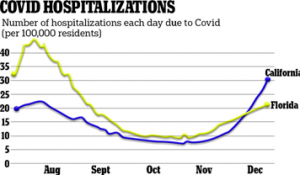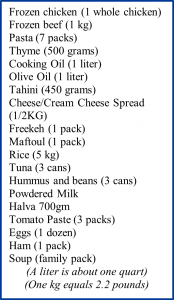Diapers for Refugees: The Covid-19 situation and continued lockdowns in the Middle East have stalled much of our Diapers for Refugees efforts, particularly in Iraq. Lockdowns are a real problem for many ministries operating in Middle East nations. Because medical care is so limited in some, the only solution the governments can seem to come up with is lockdowns.

A reality check: California had nearly total lockdowns with even public parks and beaches closed. Florida had virtually no lockdowns. The result? The numbers of infections per 100,000 residents were almost exactly the same in both California and Florida.
Charts of month infection rates shows the two states as almost identical although Florida had fewer cases of Covid-19 and fewer hospitalizations per one million residents than California overall. The lockdowns did little to help, and many people were infected in their homes by someone that had to work.
It isn’t getting better in the Middle East because many of those nations cannot afford to buy any Covid-19 vaccines. They do lockdowns instead making economic measures worse.
Because of the lockdowns our Diapers for Refugees program came to a halt except inside some churches. In the Iraqi city of Dohuc we have one church distributing infant diapers, and the Assyrian Aid Society distributing both infant diapers and adult diapers to the neediest Christians.
Our diaper and food programs in the areas of the Holy Land controlled by the Palestinian Authority continue, but again the number of cases there continues to climb.
Although Israel had inoculated over half its population by mid-February, only 5,000 doses of vaccine had made their way to the West Bank where 2.9 million Palestinians live. None of the 5,000 vaccine shots were given to Christians in the West Bank. (Note: Our worker there, and his entire family have already suffered from Covid-19. )

The Christian population of the West Bank has dropped under Palestinian Authority control and is now about 50,000, far too few to maintain a self-sustaining population.
We have a food program for those Christian families most in need in Bethlehem and in the Christian town of Beit Sahour. Each month our worker and volunteers deliver packages of food to impoverished Christian families.
Lists of families in great need are obtained from churches and each has a story.
One of the families consists of a widow who has 5 children. Her husband died 10 years ago at the age of 35 due to cancer. She was left all alone to raise and provide for her 5 children.
Another family we help consists of a widow named Nadia, 71 years old, living with her 2 sons. Her eldest son is 50 years old and is unable to work due to being almost completely blind. He can only see within a yard and with a blurry vision. The other son has been handicapped most of his life and unable to move his body on his own at all.
Nadia is now unable to work due to her age and physical health and is constantly in need of support as there isn’t any source of income for the family. When we knocked on her door and provided her with
the food packages and told her that we will see her in a month, she was both confused and happy, with tears in her eyes that she was holding back in front of us.
There is no help for Christian families such as these from the Palestinian Authority. In the next newsletter I will share more stories of these families with you.
William J. Murray, President
